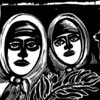
The Jerusalem Declaration
20 November 2003
Nothing in the horizon seems to hold the key to a lasting peace, despite unusually loud rhetoric surrounding the latest two peace initiatives, the Geneva Accord and the Nusseibeh-Ayalon Statement. Sam Bahour and Michael Dahan say that if their two peoples and official representatives cannot sign on to this 98-word declaration (only 31 words more than the Balfour Declaration of 1917), then it is irrelevant to hide behind volumes of peace initiatives and accords that no one will read but the majority will oppose. Read more about The Jerusalem Declaration








